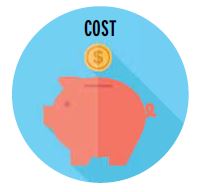Corporate tax practice is becoming more complicated, and the expectations placed on TEI members more demanding. So it’s not surprising that more corporate tax practices are considering or already outsourcing more tax functions. How do you make the decision to outsource, and what are the challenges facing those companies that do? The roundtable, moderated by Tax Executive Senior Editor Michael Levin-Epstein, included: Walter B. Doggett III, vice president of tax for E-Trade Financial Corporation and chapter representative for TEI’s Baltimore–Washington Chapter; Susan Musch, head of tax for Sasol North America, TEI Executive Committee member and chapter representative for TEI’s Houston Chapter; and Tony Valento, vice president of tax for Orbital ATK and chapter representative for TEI’s Minnesota Chapter.
Michael Levin-Epstein: Let’s begin TEI’s fourth roundtable with a basic question: In terms of outsourcing in the last decade, do you think it’s on the rise, declining, or about the same?
Walter Doggett: I would say that outsourcing is continuing to increase. I believe that outsourcing is due first and foremost to the fact that the corporate tax management function is increasingly complex. This is particularly true if a company is operating in multiple states and numerous foreign countries. It is also reflective of the many types of taxes we now face: income and franchise (both federal and state), property, sales and use, and transfer taxes. It is important to have expertise in all these areas, which is often not found completely under one roof.
Tony Valento: I agree with Walter regarding the variety of reasons and his rationale. In addition, we always hear the phrase “do more with less” or “do more with the same” as companies grow, or expand into different geographical areas, with tax teams taking on different types of taxes and tax responsibilities than what they’ve had in the past, which starts to stretch the team’s bandwidth. As a result, we have to look at what discrete projects we might be able to get some outside help with by outsourcing, or possibly if there is a temporary need to bring in some contract help, to meet the demand.
 Susan Musch: I agree with Walter and Tony on why outsourcing is continuing to increase. Tax departments face head-count and resource limitations while needing particularized expertise to handle the multitude and complexity of taxes for their industries and geographic locations. I have seen this, for example, in the case of indirect taxes where you need to have localized expertise.
Susan Musch: I agree with Walter and Tony on why outsourcing is continuing to increase. Tax departments face head-count and resource limitations while needing particularized expertise to handle the multitude and complexity of taxes for their industries and geographic locations. I have seen this, for example, in the case of indirect taxes where you need to have localized expertise.
Levin-Epstein: Are you aware of any companies that do everything in-house and don’t outsource anything?
Valento: I am not.
Doggett: No, that would be very difficult to achieve. I am aware of several recent examples where the entire tax compliance function has been outsourced.
Musch: No, I am not. If there are, I expect they’re rare.
Levin-Epstein: Whose decision is it at a company to go to outsourcing? Is it decided by a committee, or is it usually one person?
Valento: The recommendation to outsource generally comes from the leader of the tax team, based on his or her team as well as their own analysis of the situation. The actual decision, however, is typically made by whomever the tax function reports to, or perhaps even further up the organization. Because at the end of the day there’s a financial implication to the decision, the CFO would certainly have a hand in the decision.
Doggett: I would agree with Tony, the recommendation to outsource a particular tax function would likely originate from the VP of tax, based upon an analysis of the strengths and bandwidth of the tax team. The ultimate decision would need to be approved up the chain of command internally before such a recommendation is actually implemented.
Musch: I also agree with Tony. More recently, I’ve seen this decision arise, for example, when an employee retired and the decision was made to outsource the indirect tax functions for which he was responsible. The decision started in the tax function but was approved up the chain of command.
Levin-Epstein: If a decision is made to outsource a particular function, either on a permanent basis or on a temporary basis for a specific project, how do you determine whom you’re outsourcing to? Is it a bid process, a request for proposal (RFP)? How does the process work?
Doggett: Once the decision is made, I would contact at least two firms with an established reputation in a given practice area and solicit an RFP. When you outsource, what you are looking for is subject-matter expertise. I rely heavily upon my relationships and contacts within TEI to help identify individuals and firms with specific subject-matter expertise. It is important to then follow through with your due diligence by personally meeting with the representatives from the firm and getting completely comfortable that they can assume this function and perform the job adequately.
Valento: I agree with Walter. Fortunately for the tax community, TEI provides us with an opportunity to reach out to our colleagues to find out which firm might be the best in a particular area within tax to provide some help with outsourced services. Occasionally we will have unique ideas brought to us by outside service providers, and—depending on the idea: how technical it is and how much time it’s going to take; if the decision is made that the planning idea is value-added and within our risk tolerance; it’s something that we’re interested in pursuing; and management agrees with our recommendation—oftentimes we will outsource that to the firm that brought the planning idea to us. That maybe sounds obvious, but I’ve seen that sometimes not being the case. If someone brings an idea to us and we don’t have the bandwidth or the technical expertise, we’ll likely engage them for the project.
Musch: I usually like to go out for two to three bids on a new project or particular function. But first, I like to get reconnaissance on which firms have been doing what and for which companies and reach out to other corporate tax practitioners to get their feedback on the services they’ve been receiving from the potential firms. I find reaching out to my TEI colleagues invaluable for this, because they will give you insight on the potential upsides and pitfalls to avoid. This insight also helps in scoping the work and estimating how much the work will cost—in money, time, and internal resources.
Levin-Epstein: Can you give an example of when that happened?
Valento: A recent tax case court decision resulted in an opportunity for taxpayers to file an accounting-method change that created shareholder value. It was a value-added idea brought to us by one of the Big Four firms, and we engaged them to implement it since we did not have the internal bandwidth to do so.
Doggett: On my end, I have developed beneficial relationships with third-party service firms by attending TEI conferences and meeting the various vendors at those conferences. One particular firm specialized in sales and use tax outsourcing. After a careful analysis, I felt this was an area that we could gain from outsourcing our sales and use tax compliance to a third-party provider. It has been a beneficial relationship, and it has allowed my team to focus more time on what we consider our core activities.
Musch: I have used outsourcing in the indirect tax area, specifically for property tax and sales and use tax where specific geographical expertise is needed. I agree with Walter that talking and meeting with the various vendors at the TEI conferences is very helpful. It is an easy way to quickly assess what various vendors can provide in a particular tax arena, i.e., a kind of one-stop shopping for information and ideas.
Levin-Epstein: When you refer to outsourcing, are you only referring to third-party vendors, or are you also referring to using private-sector law firms?
Valento: We didn’t really define outsourcing. We did talk about what it meant to us, but we didn’t define “are we talking about outsourcing an entire department?” or maybe a fixed-asset project or R&D project or whatever it may be, because there really is a range of outsourcing projects. The range of possibilities for outsourcing, or bringing in temporary outside help, really is very broad. To answer your question, service providers could range anywhere from contract workers that you bring in on a temporary basis from a firm that can provide qualified candidates for the contract work to just outsourcing a discrete project—such as research and development—to a third-party service provider, like a public accounting firm or possibly even to a law firm. Although I think I’ve outsourced less to law firms than I have to accounting firms.
Doggett: I would agree with Tony, I would actually call what we do in several key areas “co-sourcing.” It is a responsibility area that we share with the third-party provider. I would view outsourcing as any function of the tax department that’s not being completed 100 percent in-house. Building on what Tony indicated, we also use third-party firms to provide temporary loan staff during our peak busy season. We can obtain well-qualified and trained tax personnel at a very reasonable cost to take some of the compliance load off my team during the peak crunch periods.
Valento: I do like the word “co-sourcing,” because as a tax leader, when you talk about outsourcing, it’s got a negative implication for your tax team that can cause concerns. Co-sourcing is essentially the same thing, but it’s a better label, because you really are working with the outside service provider—you’re not simply turning over the responsibility for a particular function or project. At the end of the day, as management, we’re still responsible for it.
Musch: Outsourcing, or co-sourcing, is really looking to all different kinds of external resources to make sure you have all the tax responsibilities and functions covered. These services can range from one-off to recurring services such as: (1) a one-off project like enhancements to tax-provision tax packages, (2) recurring extra help during tax compliance season, (3) special one-off projects like tax help during the construction of a plant, or (4) outsourcing of an entire tax function like sales and use tax compliance. And yes, it certainly can include the use of private-sector law firms, such as for help in major acquisition or restructuring transactions.
Levin-Epstein: So when you do these co-sourcing arrangements, do the co-sourcing organizations sometimes come on your premises?
“The recommendation to outsource generally comes from the leader of the tax team, based on his or her team as well as their own analysis of the situation. The actual decision, however, is typically made by whomever the tax function reports to, or perhaps even further up the organization.”—Tony Valento
Doggett: Generally not. We will have a kick-off meeting to define the scope of the relationship and make certain that we know the key players and contact people within the firm. For example, with our sales and use outsourcing, we provide monthly information to the third-party provider, and they use that information and complete the various state sales tax returns. I will conduct a final review for reasonableness and accuracy before the sales tax returns are actually filed with the taxing authorities. As I indicated before, the ultimate responsibility for every tax function still resides in-house.
Valento: For us it depends. We do have situations where we bring in loaned staff, where they will be working side by side with members of my tax team, and in other instances when it’s a discrete project—like R&D or DMD [domestic manufacturing deduction]—those are really outsourced or co-sourced with public accounting firms, and ninety-nine percent of the work is done outside of our offices on those projects.
project—like R&D or DMD [domestic manufacturing deduction]—those are really outsourced or co-sourced with public accounting firms, and ninety-nine percent of the work is done outside of our offices on those projects.
Doggett: I’ll piggyback on what Tony said when it comes to loan staffing. We have found it much more beneficial to have loan staff on site simply from a control perspective. It also improves overall efficiency. If the loan staff may have questions, there is a manager immediately nearby that can assist them and to keep the process running smoothly and efficiently.
Musch: It depends on the kind of services being provided and what kind of company data that service provider needs to perform the services. If there is a multitude of detailed data that makes it too cumbersome to access remotely, the service provider will likely be on site for at least part of the engagement. As Tony said, discrete services like R&D can generally be performed off site.
Levin-Epstein: In the HR field, for example, there are some things that many companies routinely outsource: payroll, for example, or benefits areas. Are there things in the tax area that are regarded as “right” areas for outsourcing—specific content areas, if you will, that increasingly are subject to outsourcing or co-sourcing?
Valento: I don’t know that there’s any particular sweet spot for tax departments to outsource. I think it depends on the company. For instance, if I pick R&D as an example for us, it’s a big project that doesn’t justify me adding a head count. Yet there are other companies that also do R&D tax credit projects that may in fact in-source instead. I’m not personally aware of any function or project within a tax department that is typically the subject of outsourcing or co-sourcing.
“When you outsource, what you are looking for is subject-matter expertise. I rely heavily upon my relationships and contacts within TEI to help identify individuals and firms with the needed subject-matter expertise.”—Walter Doggett
Doggett: Just like Tony, we outsource our R&D tax credit function to a specialty boutique firm. The cost–benefit analysis is a significant factor in this relationship. The total cost of the yearly engagement is about half of what I would have to pay for a full-time employee to complete the same project. Generally, I have noted that tax compliance is the leading area that is most often outsourced among corporate tax departments.
Musch: It’s a “right source” decision, which depends on the current and particular facts of the company. We also outsource R&D, because it makes sense from a head-count and internal resource perspective.
Levin-Epstein: There would appear to be at least two key determinants of whether to outsource or co-source: a cost-benefit analysis of whether you want to add additional head count, and the level of expertise you may have in-house. Do other factors play into the decision-making process?
Valento: For us it also has to do with bandwidth—that’s another one of my favorite words these days. Let’s say we settle an IRS audit, and the next thing I’m going to have to do is file more than 200 amended state tax returns within a prescribed statutory period to avoid penalties, and I simply don’t have the bandwidth to do that. So I’ll co-source that discrete project to a third-party service provider. Or, if we are running hot and heavy in mergers and acquisition activity, I have a need to supplement my team, because our bandwidth is being stretched so thin.
Doggett: I like the bandwidth concept since it very applicable in our organization as well. Whenever we need to file any federal amended tax returns, it creates an immediate and sometimes crushing tax-compliance responsibility on the state side. I currently have temporary loan staff on premises for the sole purpose of filing amended state tax returns for prior tax years. It is also a matter of priorities. We are currently in the process of implementing a new tax-provision software package, which requires a significant amount of time and resources from my team. Accordingly, I have decided to outsource some of tax compliance this year because I want to purposefully reallocate my resources to this higher-priority project this year.
Musch: As part of the cost-benefit and head-count analyses, you need to look at the company’s and the tax department’s short-term to long-term goals. It doesn’t make sense to add head count for a one-off project that has a short, finite period. So, for example, where you know that your company is acquiring another company with a fully functioning tax department, it may not make sense to add more head count in your department during the acquisition, depending on the facts. Similarly, if you have a one-off upgrade to your tax-provision system and reporting process that will make the process more efficient, it may not make sense to bring on full-time tax personnel when they won’t be needed after the project is completed.
Levin-Epstein: From a policy point of view, discuss the pros and cons of outsourcing in the tax area.
Valento: One of the pros would be to afford myself the ability of having my tax team focus on the more value-added projects. There might be a project that I want my team to work on, but they’re so busy with compliance or an audit that they can’t break away from that because that work has to be done. So if I can bring in some outside help to work on the compliance or the audit, then I can redirect my team to the value-added project. The other side of the coin is every time I do that, the institutional knowledge gained by doing a project walks out the door with the service provider when the project is done; it’s not being retained within my tax team.
Doggett: Those are excellent points. I think in terms of the pros, outsourcing can be a significant time savings and can free up your staff for higher-priority projects. In terms of the cons, there is always some element of risk. Ultimately, it is my responsibility of the VP of tax to ensure that all tax returns are filed timely and accurately—so there is a degree of monitoring which is always required. Personally, I am not a big fan of fully outsourcing the yearly income tax compliance function. I view that as a core function of a corporate tax department. If your staff never has the opportunity to prepare income tax returns, how can I expect them to develop the expertise to review the income tax returns? I believe this is an important building block in their career as a corporate tax professional. The tax-compliance roles that I typically prefer to outsource are sales and use taxes and personal property taxes.
Valento: I definitely agree with Walter regarding the importance of your team understanding how to do income tax compliance. As he said, it’s not only developmental for the team, but it’s also instrumental to understanding when the IRS or a state comes along to audit. It’s a fairly easy transition if you’ve got the same people working on the audit that prepared the return. And there is a tie-in with the tax accounting as well. At the end of the day, it all comes back together in a full cycle from planning to accounting to compliance to audit defense. All those pieces have to come together for us, and to the extent that we have the bandwidth to do it all internally, to me, that’s the best model. Unfortunately, it doesn’t always work out that way.
Musch: I believe it’s important to consider both the potential for the building of institutional knowledge and the development of staff when considering outsourcing. If you don’t consider these potentials, you may have a short-term benefit from outsourcing but a long-term deficiency that you’ll have to address later. Also, with respect to outsourcing a tax function, it’s important to set up the outsourcing process so that your internal resources are appropriately freed up from associated tasks related to the outsourcing. And you must manage the outsourced function so that you, as the process owner, know what’s going on and are managing the costs related to that function.
Levin-Epstein: Can you give me an example of something you outsourced that worked out better than you thought or worked out perfectly and why you thought it worked out so well? And, if you want (without naming names), an instance of where it didn’t work out and why you think it didn’t work as well as you had hoped?
Doggett: It’s easier for me to think of an example that has worked, and I am very thankful for that. With our R&D tax credit outsourcing project, the relationship has produced some very significant  tax savings. However, this is often a hotly contested item upon audit. I have been particularly pleased with the audit defense which the firm has provided to sustain the R&D tax credits claimed on the tax return. The firm has stood side by side with us battling this issue with the IRS auditors, and we have had very successful recovery rates. I think that audit defense is a critical element of the outsourcing function.
tax savings. However, this is often a hotly contested item upon audit. I have been particularly pleased with the audit defense which the firm has provided to sustain the R&D tax credits claimed on the tax return. The firm has stood side by side with us battling this issue with the IRS auditors, and we have had very successful recovery rates. I think that audit defense is a critical element of the outsourcing function.
Valento: I agree with Walter; I have more examples of where outsourcing has gone well. Our R&D tax credit as well as our DMD—those are two discrete projects where the cost–benefit analysis does not make sense for me to add the head count to do those projects, and the quality of the deliverables has been very good for us. I will say, on the other side of the coin, I am aware of situations where the entire tax function of a company has been outsourced. These arrangements typically do not work out in the long run, and the companies that try this generally end up rebuilding their internal tax teams.
Musch: Yes, I too have more examples of when outsourcing/co-sourcing has gone well. I have also seen companies from time to time outsourcing their entire tax function and eventually bring it back in-house.
Levin-Epstein: So what is the most difficult part in managing an outsourcing relationship? Is it communication? Expertise?
Doggett: That’s a good question. I would say the regular monitoring of the existing relationship. Even when an outsourcing arrangement is working extremely well, I am still held accountable for the performance of the overall tax function. Should there be a change in key personnel at the third-party provider, I need to become comfortable that the new personnel can perform the function up to the same high standards. It is the close monitoring and validating that is probably the most time-consuming part of the process.
Valento: That’s a great answer, and I would add to it that communication is the most challenging part. There are two pieces. One is communicating to senior management the need to outsource or co-source, because we all work for for-profit companies. And whatever we outsource, there’s a cost there. So building the business case and the cost–benefit analysis—it’s communicating that in a way so senior management can appreciate what we’re trying to do. I would also echo what Walter said about the service provider. It’s easy to communicate with them when things are going well, but if there are some bumps along the way, depending on the relationship that you have with them, those communications can be a little difficult. But that’s part of our jobs.
“I have used outsourcing in the indirect tax area, specifically for property tax and sales and use tax where specific geographical expertise is needed.”—Susan Musch
Musch: Developing the process of providing and receiving information, ongoing communication, and managing the relationship and function with the service provider are key to the success of outsourcing. While some outsource providers volunteer to go directly to other departments in the company for information, I’ve found that it is better for in-house tax personnel to either be the intermediary or else to be integrally involved in the data collection process.
Levin-Epstein: Is there anything else you want to add that you think people should know about outsourcing?
 Doggett: It is very difficult for any tax department to perform every single tax function in-house. There are so many different types of taxes, state taxing jurisdictions, and foreign countries. I believe it is important to recognize when a subject-matter expert can add significant value to a corporate tax department. Also, it is critically important to develop your network and build professional relationships to allow you to identify subject-matter experts in a particular practice area. I have learned to identify these key players to a large extent through the network and relationships which I have established as a member of the Tax Executives Institute.
Doggett: It is very difficult for any tax department to perform every single tax function in-house. There are so many different types of taxes, state taxing jurisdictions, and foreign countries. I believe it is important to recognize when a subject-matter expert can add significant value to a corporate tax department. Also, it is critically important to develop your network and build professional relationships to allow you to identify subject-matter experts in a particular practice area. I have learned to identify these key players to a large extent through the network and relationships which I have established as a member of the Tax Executives Institute.
Valento: I agree with Walter; he said that very well. The one thing I would add is, frankly, I don’t care who you are or what company you work for, it’s likely that at some point in your career, there’s going to be a need to supplement your tax team’s bandwidth so it doesn’t snap. Those are the opportunities, and you need to be able to identify the need and do what you need to do to move forward with co-sourcing or outsourcing a function or project within your department in order to meet all the demands placed upon us these days.
Musch: To coin a cliché, for the tax department to fully cover all of its responsibilities, you need to have all the chess pieces in the right spots on the chess board. This means looking at in-house resources and constraints; short-term and long-term goals, needs, and budgets of the tax function and company; and what makes sense from a growth and longevity perspective of the tax function as well as the company. As Walter said, building your relationships is vital to the success of your outsourcing engagements. And the more you work as a team with your outside resources on the particular engagement, the better the process will be, from both a results and cost perspective.




